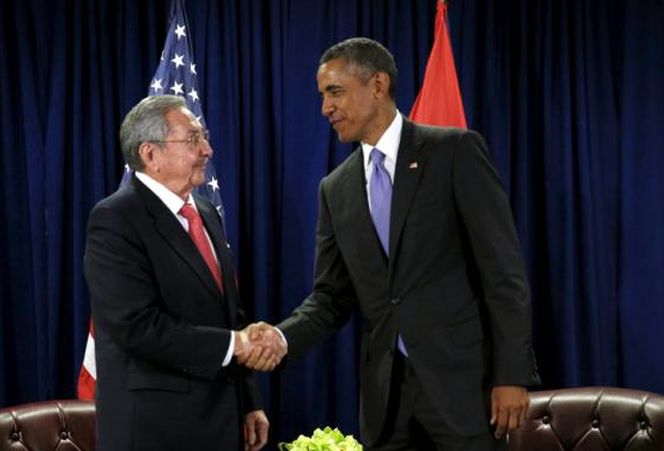 One year after the sensational announcement made by Presidents Raul Castro and Barack Obama about the decision to restore diplomatic relations between Cuba and the United States, the balance is quite positive despite the many sticking points in the full normalization of links, due to the different approaches of the two countries on issues of bilateral and international politics.
One year after the sensational announcement made by Presidents Raul Castro and Barack Obama about the decision to restore diplomatic relations between Cuba and the United States, the balance is quite positive despite the many sticking points in the full normalization of links, due to the different approaches of the two countries on issues of bilateral and international politics.
Cuba and US Discuss Re-establishment of Diplomatic Relations
Cuba-USA Bilateral Relations Get under Way
In the first place, this announcement was a phenomenal success for Cuba, since, after 18 months of secret negotiations in Canada, all of a sudden, the White House had to publicly admit the failure of the aggressive policies implemented by more than half a century against the island. And Cubans had the satisfaction to see the return of three of the Five antiterrorist heroes, who were kept in US prisons for more than 16 years.
On the other hand, it was not easy to continue to isolate and harass Cuba, at a time when its tremendous educational and health support to other countries was beyond doubts, as well as its decisive contribution to the fight against Ebola in Africa. Moreover, the celebration of the historic Summit of the Americas in Panama depended on the presence or absence of Cubans, as several heads of state from the region had already warned about.
If we were to mention peak moments of this approach, we would also have to mention the participation of our country at the abovementioned Summit of Panama in April 2015, the meeting between Raul and Obama, and the president’s decision to withdraw Cuba from the list of countries that encourage or promote terrorism, announced on April 14 before Congress.
Other relevant moments of the rapprochement process are the official opening of embassies on July 20, with the inauguration of the Cuban diplomatic mission in Washington, as well as the ceremony to restore the US embassy in Havana, on August 14, with the presence of Secretary of State John Kerry.
During a press conference held on that same occasion at Havana’s Hotel Nacional, Kerry announced the creation of a bilateral commission to address issues of common interest. Meanwhile, since the beginning of January this year, significant encounters have been taking place between politicians, officials and businessmen from the two countries.
So, on January 16, a relaxation of some restrictive measures derived of the US blockade on the island, regarding trade and travel, were announced. Another important moment was the visit of Roberta Jacobson, then assistant secretary of state for Latin America, who led the delegation of his country to the first round of Cuba-US talks, held January 20 to 24.
Meetings have continued to take place alternatively in Havana and Washington, which have been faced with obstacles like the most recent encounter on migratory issues, held in the USA. On that occasion, Cuba denounced the Cuban Adjustment Act and the absurd policy of dry feet-wet feet as major cause of the problem raised in Costa Rica for the massive presence of Cubans who try to illegally reach US territory.
In fact, normal relations will only be only possible when the United States lift the blockade, remove the Adjustment Act and the Parole Program for Cuban medical professionals, and indemnifies the island for the damages caused for over half a century.
For a real rapprochement, Washington will also have to meet the requirement of returning the naval base of Guantanamo, and stop the radio and propaganda aggressions against Cuba. Only then the relationship will be honest, fair and transparent.
This does not deny recent progress of both nations on issues such as air and sea communications, environmental protection, the fight against drug trafficking and natural phenomena, among several other topics of mutual interest.
In fact, 12 months is a short time to resolve the sticking points accumulated during 55 years of aggressive practices against the island by the superpower. Now the challenge is that US internal factors and its aggressive foreign policy against friendly nations of Cuba don’t spoil what it’s trying to be built.
 Escambray ENGLISH EDITION
Escambray ENGLISH EDITION





Escambray reserves the right to publish comments.